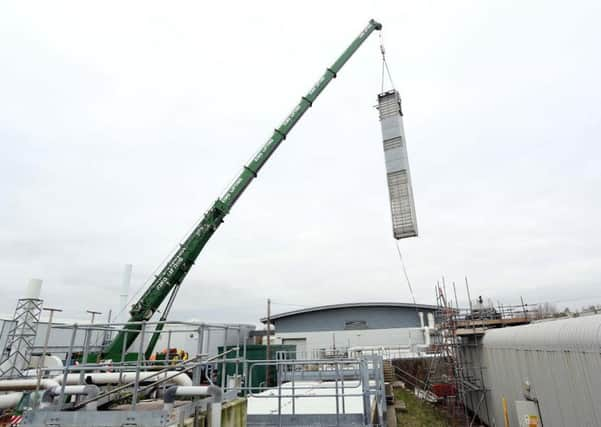Southern Water faced an ‘unprecedented emergency’


A jury sitting at Chichester Crown Court has been hearing the closing speeches of both the prosecution and defence in the trial of Southern Water.
The court case relates to an incident in September, 2012, in which a failure of the treatment works in East Worthing caused the water company to expel an estimated 40million litres of raw sewerage out into the sea, closing all the beaches between Lancing and Ferring for six days.
Advertisement
Hide AdAdvertisement
Hide AdSpeaking in his closing speech, Prosecutor Richard Banwell told the jury that Southern Water was guilty of acting against the law and claimed the company faced no real threat of danger – or at least not one enough to justify its actions.
“Was there a danger to human health?” he questioned the jury to consider. “Danger you might think is something more than a mere risk. Danger you might think is something a little more imminent so that the situation becomes ‘dangerous’.”
The Environment Agency, prosecuting, claims that a build up of ‘ragging’ - toilet tissue and sanitary products - contributed to the pumps’ failure.
Giant band screens, which filter rag out of the works, had been removed from the site and temporary bar screens were in place at the time of the incident.
Advertisement
Hide AdAdvertisement
Hide AdIn his closing speech Mr Banwell claimed that faulty milltronics sensor had also been acting ‘erratically’ prior to discharge.
He added: “With the screens gone Southern Water simply did not actively deal with the consequences particularly when the sensor itself costs hundreds of pounds. This was not a discharge made in an emergency.
“Failure of the pumps could not be unexpected in the state that the pumps were in. The discharge did not take place in an emergency and not in order to avoid the danger of public health.
“Members of the jury the verdict you should return in this case is one of guilty.”
Advertisement
Hide AdAdvertisement
Hide AdHowever, responding to the comments, defence counsel Richard Matthews QC argued this was a scale of a emergency never before experienced by Southern Water and that to say otherwise was ‘madness’.
He reminded the jury of evidence revealed earlier in the court case, by Steven Harper, a senior electrical and mechanical engineer at Southern Water.
Mr Harper has worked at Southern for the best part of 29 years and had not experienced anything like the situation facing the water firm in September 2012, Mr Matthews told the jury.
The defence counsel urged to jury to focus on two key areas of the case: did Southern Water face an unexpected, emergency situation and was there a danger to human health, had the water company not acted by ejecting the sewage into the sea.
Advertisement
Hide AdAdvertisement
Hide AdHe explained that the burden of proof the jury had to work on was on the balance of probabilities, lower than most criminal law case of beyond all reasonable doubt.
The QC claimed all the evidence surely pointed to Southern dealing with a sudden and unexpected emergency which would have put human health at risk.
“The failure of the milltronics unit was unprecedented,” he added. “Was it probably an emergency? On the evidence, yes.
“Was it probably done to avoid the danger of human health – the discharge that is – probably, yes. It was probably done to avoid a real risk of having to evacuate or shut down Worthing Hospital.
Advertisement
Hide AdAdvertisement
Hide Ad“If Worthing Hospital flooded or if the hospital had a risk of flooding or having untreated effluent coming up from the sewers in to it then is that not an obvious danger to human health because wouldn’t you have to clear the hospital before the effluent got there?
“So the idea that this discharge was not done in order to avoid danger to human health is, with the greatest of respect, madness.”
The trial is set to conclude tomorrow morning with a summing up from judge Christopher Parker QC.
The jury will then retire to determine its verdict.
Advertisement
Hide AdAdvertisement
Hide AdThey related to alleged breaches of environmental permits between November 30, 2011 to September 4, 2012 due to the removal of the screens.
Because there was no evidence to say why the screens had broken down, or how long they should expect to take to repair, Judge Parker asked the jury to deliver not guilty verdicts for counts one and two.
The jury is only being asked to consider count three, that Southern Water discharged the sewage because of a sudden and unexpected emergency; that it was done to avoid danger to human health; that it took all reasonable steps to minimise pollution; and that the Environment Agency was notified within a reasonable time.
Don’t miss out on all the latest breaking news where you live.
Advertisement
Hide AdAdvertisement
Hide AdHere are four ways you can be sure you’ll be amongst the first to know what’s going on.
1) Make our website your homepage
2) Like our Facebook page
3) Follow us on Twitter
4) Register with us by clicking on ‘sign in’ (top right corner). You can then receive our daily newsletter AND add your point of view to stories that you read here.
And do share with your family and friends - so they don’t miss out!
Always the first with your local news.
Be part of it.